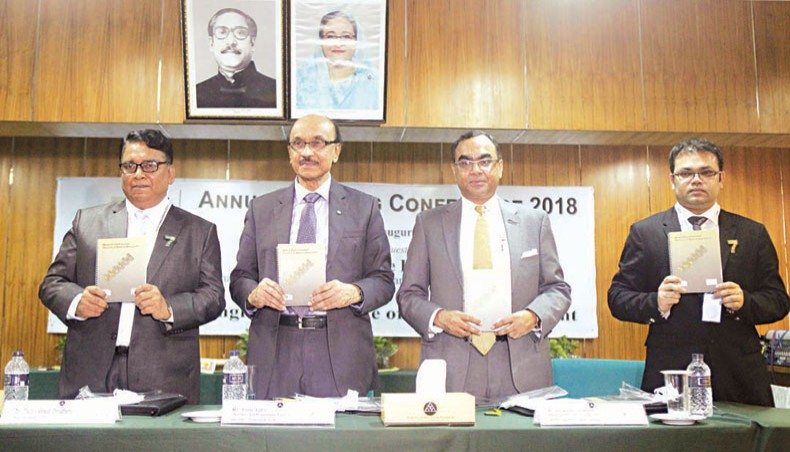Bangladesh Bank governor Fazle Kabir and Bangladesh Institute of Bank Management director general Toufic Ahmad Choudhury are seen with the officials holding newly introduced publications at the 7th annual banking conference organised by BIBM at its premises in Dhaka on Wednesday. — New Age photo
The overall situation in the country’s banking sector has not improved much due to lack of monitoring, poor internal governance and inadequate data assessment system, said experts on Wednesday.
They made the observation at the 7th annual banking conference organised by Bangladesh Institute of Bank Management at its premises in capital Dhaka.
BIBM director general Toufic Ahmad Choudhury said, ‘In spite of continuous Bangladesh Bank efforts for creating hedge finance environment, NPL (non-performing loan) situation, single client financing by multiple banks and overall credit governance did not improve in 2017.’
‘Unearthing of some loan scams and imposition of loan and deposit rates by some private sector bank sponsors, bypassing central bank, would have no positive impact on credit situation, rather it may aggravate the overall banking environment,’ he said.
Bangladesh Bank governor Fazle Kabir said that corporate governance was more of a culture and habit to be fostered continuously rather than a banking regulation that the regulators imposed on them.
He also said that all the innovations and new banking products would be rendered to be excising feasibility if corporate governance was not present at due level.
Toufic also said that lack of good intention of board of directors and senior management of the banks was the most important barrier to making an independent and strong internal control and compliance system.
Incidence of trade-based money laundering continued as a growing concern for the policymakers and the central bank because of lack of appropriate enforcement of available regulations, Toufic said.
‘New payment systems are also vulnerable to money laundering risk, therefore banks should identify, assess and understand money laundering risks associated with the national payment switch,’ he said.
BIBM found no standard manual for employee recruitment, job hierarchy and evaluation and training, leadership succession plan in most of the banks.
In order to establish a robust, sustainable and resilient banking system, the banking governance especially the internal banking governance must be improved and supervisory and regulatory grip of Bangladesh Bank should be strengthened, Toufic suggested.
Bank Asia researcher Mohammad Omar Faruk in a paper said that huge amount of defaulted loans became ‘cancer’ for the financial market in the country as international standard of NPL was below 2 per cent while the NPL in Bangladesh was above 10 per cent.
The NPL ratio stood at 10.8 per cent in March, 2018 compared with the ratio of 9.8 per cent in the previous quarter.
Faruk said, ‘It [NPL] is one of the burning problems for the banking sector in the country due to its multifarious adverse impact on so many banking variables in general and on profitability and solvency position in particular.’
He mentioned that political influence, national economic downward trend, poor industry analysis, reduced consumer buying ability and legal issues were the factors that influenced NPLs the most.
The state-owned banks often act as if they were fiscal agencies, providing poor follow-ups once a loan is disbursed, he said.
Aggressive, unscrupulous and target-oriented banking indirectly increase NPL, he said adding that the unhealthy and bad competition and practices were exercised between the banks and between the bankers.
To reduce the defaulted loans, the regulators should impose some restrictions on loan defaulters, such as not allowing them to purchase flat, housing and car, and establishing new company, Faruk said.
Dhaka Bank managing director Syed Mahbubur Rahman said that lack of asset and industry assessment of borrowers and follow-up after disseminating the loans resulted in huge NPLs.
Trust Bank managing director Faruq Manuddin Ahmed said that the central bank should separate the wilful defaulters from other defaulters and punish the wilful ones in an appropriate manner.
Source: New Age.

